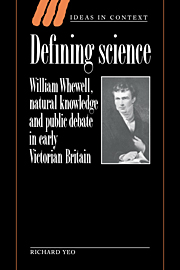2 - Science and the public sphere
Published online by Cambridge University Press: 22 August 2009
Summary
In the late nineteenth century, the intellectual historian John T. Merz wrote that: ‘It will be generally admitted that the scientific spirit is a prominent feature of the thought of our century as compared with other ages. Some may indeed be inclined to look upon science as the main characteristic of this age.’ In saying this and then devoting a major part of his work to the nature and development of natural science Merz was confirming its emphatic presence in the culture of that time. But he went on to state that it was ‘not necessary to define what I mean by science’, thus recording the distance between his position in the 1890s and that of writers earlier in the century who regarded the definition of the aims, methods, and cultural status of natural knowledge as a crucial and difficult task (Merz 1896–1904, 1, 89).
My aim in this chapter is to set out a framework in which these early Victorian debates can be understood, to discuss the intellectual and social conditions that sustained a discussion not only of scientific discoveries but of the nature of the scientific enterprise. In this period there was a wide-ranging debate on the nature of science covering topics which are now the focus of separate, professional areas of study. Thus John Herschel could discuss quite detailed points of scientific method in his Preliminary discourse on the study of natural philosophy (1830), a book published in a popular Cabinet cyclopaedia.
Information
- Type
- Chapter
- Information
- Defining ScienceWilliam Whewell, Natural Knowledge and Public Debate in Early Victorian Britain, pp. 28 - 48Publisher: Cambridge University PressPrint publication year: 1993
Accessibility standard: Unknown
Why this information is here
This section outlines the accessibility features of this content - including support for screen readers, full keyboard navigation and high-contrast display options. This may not be relevant for you.Accessibility Information
- 1
- Cited by
